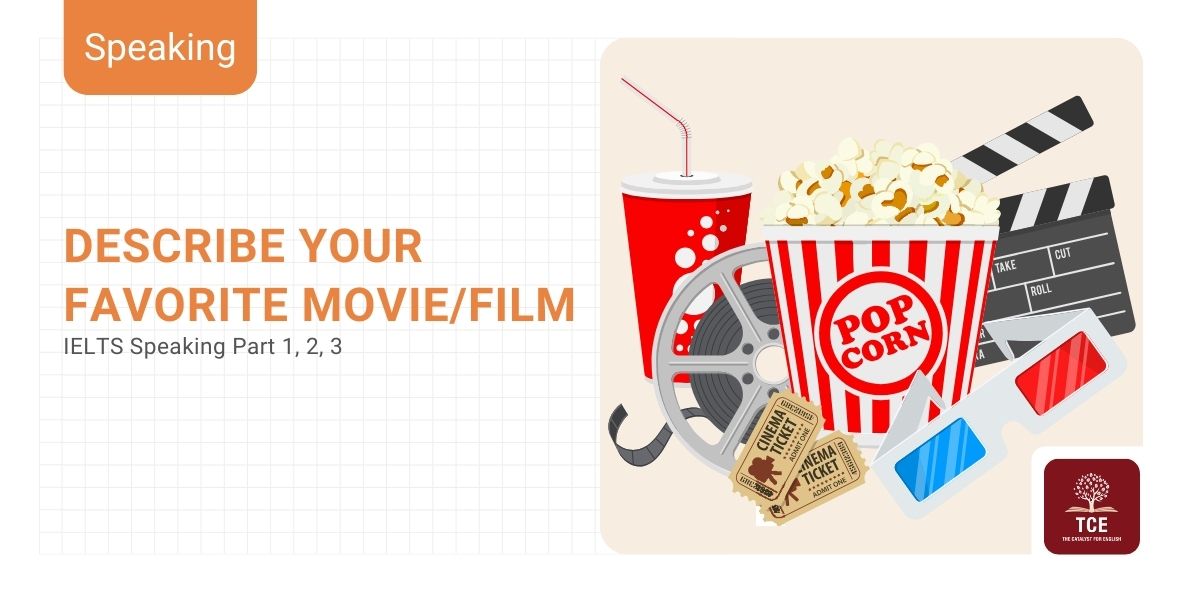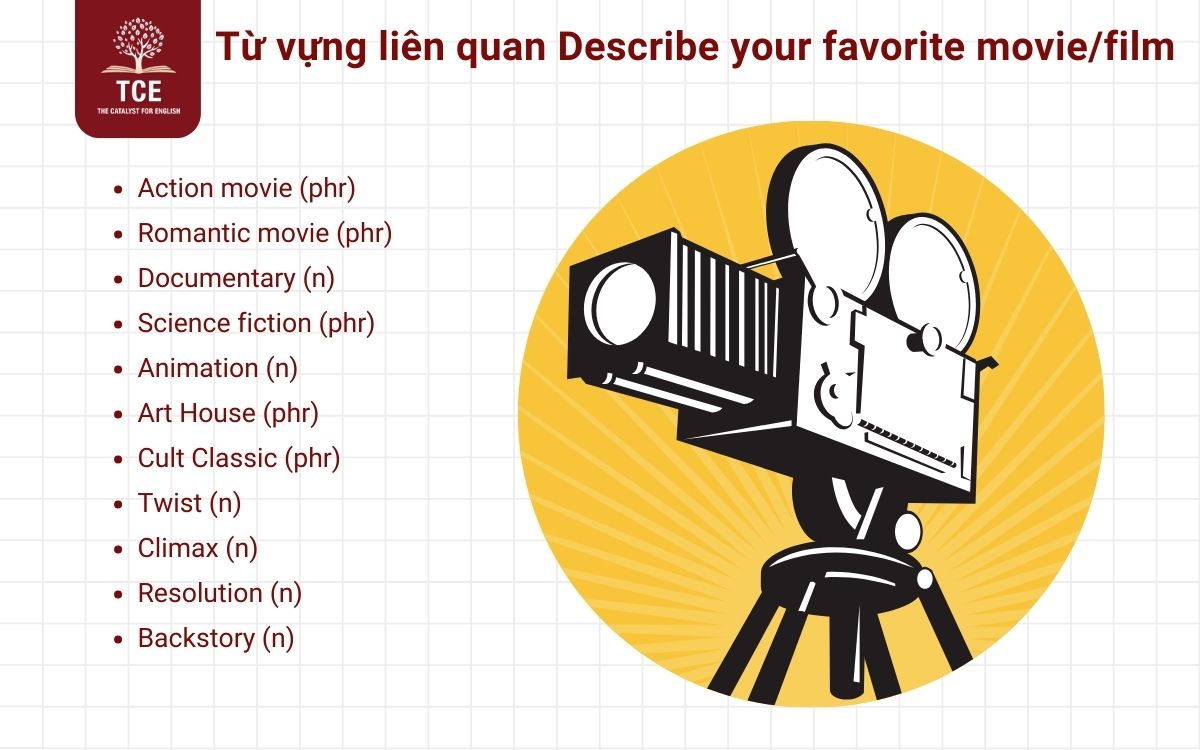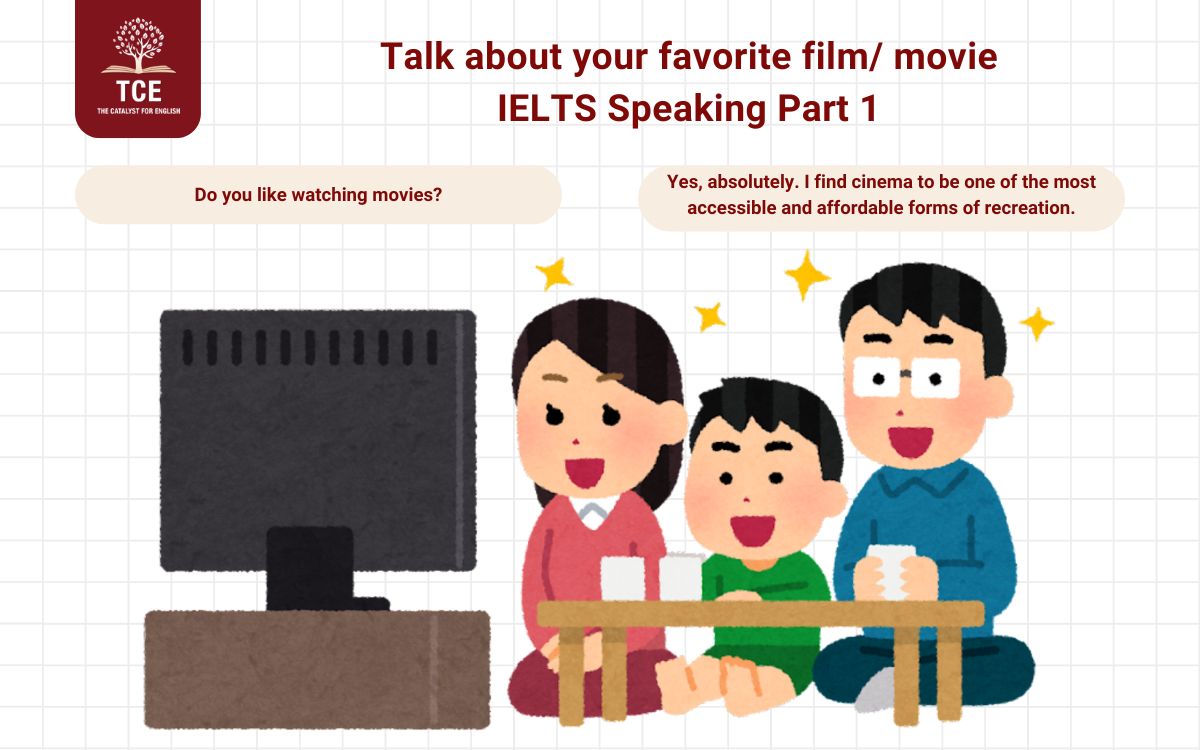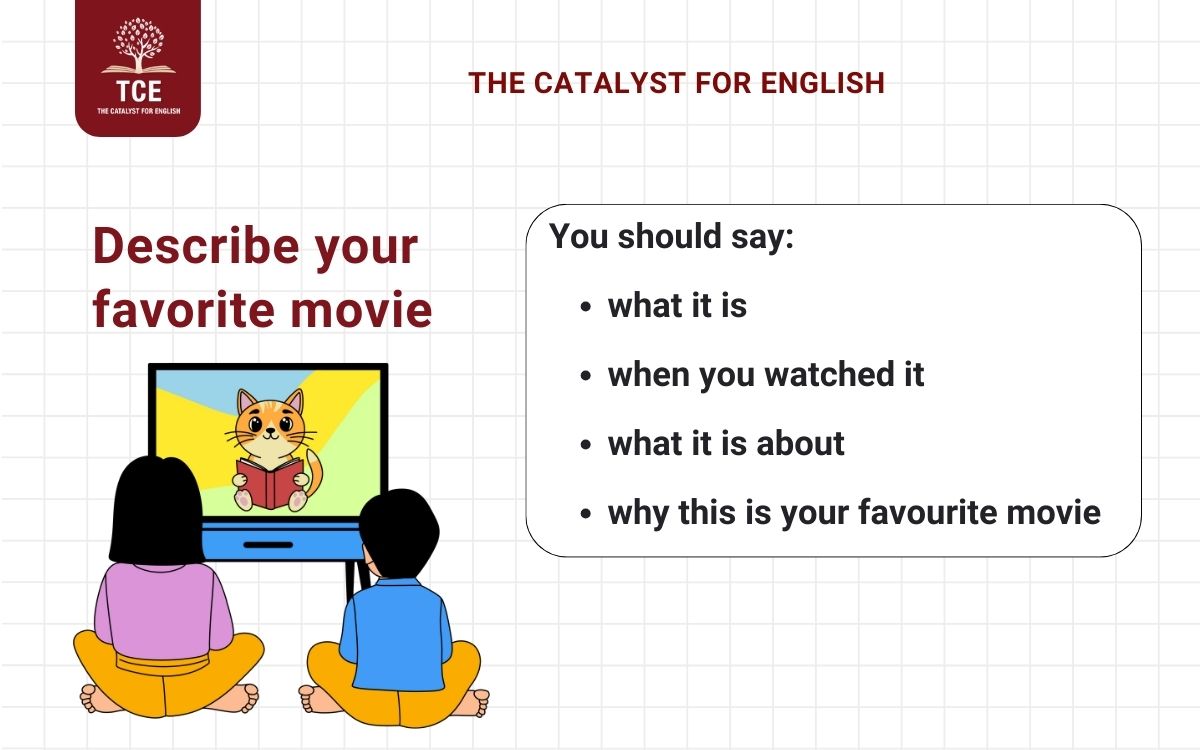Mạo từ The là gì? Hướng dẫn cách đọc The trong tiếng Anh
Đọc sai mạo từ 'the' là một trong những lỗi phổ biến nhất khiến tiếng Anh của người Việt nghe thiếu tự nhiên. Dù chỉ là một từ ngắn gồm 3 chữ cái, nhưng cách đọc the lại thay đổi...

Để chuẩn bị tốt nhất cho kỳ thi IELTS, một trong những nhóm chủ đề quan trọng mà bạn không thể bỏ qua là Movie and Book. Bài viết dưới đây của The Catalyst hy vọng sẽ giúp bạn chinh phục thành công chủ đề “Describe your favorite movie/films”với từ vựng và bài mẫu cho cả ba phần của bài thi: Part 1, Part 2, và Part 3 nhé!
Trước khi vào bài mẫu về “Describe your favorite movie”, hãy cùng The Catalyst for English tìm hiểu cấu trúc câu thường dùng trong chủ đề IELTS Speaking này nhé:
Sau đây là một số từ vựng thuộc chủ đề “Describe your favorite movie/film mà các bạn có thể áp dụng trong bài nói của mình.

Từ vựng liên quan Describe your favorite movie/film
| Từ vựng | Nghĩa | Ví dụ |
| Action movie (phr) | Phim hành động | Example: “I love watching action movies because they are full of exciting scenes.”
“Tôi thích xem phim hành động vì chúng đầy những cảnh gay cấn.” |
| Romantic movie (phr) | Phim tình cảm | Example: “Romantic movies often explore themes of love and relationships.”
“Phim tình cảm thường khám phá các chủ đề về tình yêu và các mối quan hệ.” |
| Documentary (n) | (Phim tài liệu | Example: “I enjoy documentaries because they provide real insights into different cultures.”
“Tôi thích phim tài liệu vì chúng cung cấp cái nhìn chân thực về các nền văn hóa khác nhau.” |
| Science fiction (phr) | Phim khoa học viễn tưởng | Example: “Science fiction movies often depict futuristic technology and alien worlds.”
“Phim khoa học viễn tưởng thường miêu tả công nghệ tương lai và các thế giới ngoài hành tinh.” |
| Animation (n) | Phim hoạt hình | Example: “Many animation movies are not just for children but also for adults.”
“Nhiều bộ phim hoạt hình không chỉ dành cho trẻ em mà còn cho người lớn.” |
| Art House (phr) | Phim nghệ thuật | Example: “Art house films are often experimental and focus more on style and meaning than mainstream appeal.”
“Phim nghệ thuật thường mang tính thử nghiệm và tập trung nhiều hơn vào phong cách và ý nghĩa hơn là sự hấp dẫn đại chúng.” |
| Cult Classic (phr) | Phim kinh điển của một nhóm văn hoá nhỏ | Example: “Cult classics often have a small but dedicated fanbase that appreciates their unique, unconventional style.”
“Phim kinh điển theo nhóm nhỏ thường có một lượng người hâm mộ nhỏ nhưng trung thành, đánh giá cao phong cách độc đáo và phi truyền thống.” |
| Từ vựng | Nghĩa | Ví dụ |
| Twist (n) | Sự bất ngờ, cú xoay chuyển | Example: The movie had an unexpected twist at the end that surprised everyone.
Cú xoay chuyển bất ngờ ở cuối khiến mọi người ngạc nhiên. |
| Climax (n) | Cao trào | Example: The climax of the movie was intense, with the main character facing their biggest challenge.
Cao trào của bộ phim rất căng thẳng, khi nhân vật chính đối mặt với thử thách lớn nhất. |
| Resolution (n) | Kết cục | Example: The resolution of the story was satisfying, with all conflicts being resolved.
Kết cục của câu chuyện rất thỏa mãn, khi tất cả các mâu thuẫn đều được giải quyết. |
| Backstory (n) | Câu chuyện nền | Example: The backstory provided essential context for the character’s actions throughout the film.
Câu chuyện nền cung cấp bối cảnh quan trọng cho những hành động của nhân vật trong suốt bộ phim. |
| Conflict (n) | Xung đột | Example: The central conflict of the movie revolved around the protagonist’s struggle for justice.
Xung đột chính của bộ phim xoay quanh cuộc đấu tranh của nhân vật chính vì công lý. |
| Arc (n) | Sự phát triển của nhân vật | Example: The character’s arc showed a transformation from selfishness to selflessness.
Sự phát triển của nhân vật thể hiện quá trình chuyển biến từ ích kỷ sang vị tha. |
| Flashback (n) | Hồi tưởng | Example: Through a series of flashbacks, we learned more about the protagonist’s troubled past.
Qua một loạt các cảnh hồi tưởng, chúng ta hiểu thêm về quá khứ đầy biến động của nhân vật chính. |
| Plot Development (phr) | Sự phát triển cốt truyện | Example: The plot development was slow in the beginning but picked up pace towards the middle of the movie.
Sự phát triển của cốt truyện diễn ra chậm ở đầu phim nhưng tăng tốc ở phần giữa. |
| Từ vựng | Nghĩa | Ví dụ |
| Protagonist (n) | Nhân vật chính |
|
| Antagonist (n) | Nhân vật phản diện | Example: “The antagonist creates obstacles for the protagonist, driving the story’s conflict.”
Nhân vật phản diện tạo ra các trở ngại cho nhân vật chính, thúc đẩy xung đột của câu chuyện. |
| Supporting Character (np) | Nhân vật phụ | Example: “The supporting characters add depth and perspective to the main storyline.”
Các nhân vật phụ làm tăng chiều sâu và quan điểm cho câu chuyện chính. |
| Từ vựng | Nghĩa | Ví dụ |
| Moved (adj) | Xúc động | Example: “I was deeply moved by the film’s portrayal of human suffering and resilience.”
Tôi cảm thấy rất xúc động trước cách bộ phim thể hiện nỗi đau và sức chịu đựng của con người. |
| Inspired (adj) | Được truyền cảm hứng | Example: “The movie left me feeling inspired to pursue my dreams with renewed passion.”
Bộ phim làm tôi cảm thấy có động lực để theo đuổi ước mơ của mình với niềm đam mê mới. |
| Heartbroken (adj) | rất buồn | Example: “I felt heartbroken after watching the tragic ending of the movie.”
Tôi cảm thấy rất buồn sau khi xem kết thúc bi thảm của bộ phim. |
| Elated (adj) | hân hoan, hạnh phúc | Example: “The uplifting ending of the movie left me feeling elated and optimistic.”
Kết thúc vui vẻ của bộ phim làm tôi cảm thấy hân hoan và lạc quan. |
| Reflective (adj) | Suy ngẫm | Example: “The thought-provoking themes of the film left me in a reflective mood, contemplating life’s deeper questions.”
Các chủ đề gợi suy nghĩ của bộ phim khiến tôi ở trong tâm trạng suy ngẫm, suy tư về các câu hỏi sâu xa của cuộc sống. |
| Unsettled (adj) | Bị bối rối | Example: “The ambiguous ending of the film left me feeling unsettled and contemplative.”
Kết thúc không rõ ràng của bộ phim khiến tôi cảm thấy bối rối và suy tư. |

Talk about your favorite film/ movie – IELTS Speaking Part 1
Dưới đây là một số câu hỏi và mẫu trả lời Part 1 mà đội ngũ TCE đã biên soạn giúp các bạn có thể chuẩn bị kĩ hơn về ideas và từ vựng trong chủ đề về Describe your favorite movie này:
Yes, absolutely. I find cinema to be one of the most accessible and affordable forms of recreation. All that is required is a device, such as a laptop or tablet, and with the variety of streaming platforms—some subscription-based, some freely available—I think it is accessible to people from all walks of life.
Từ vựng:
I currently enjoy psychological horror movies because they often deal with the intricate workings of the human mind, which are very intellectually engaging and emotionally intense. I also enjoy slow-paced and artistic films, often found in the arthouse genre, which usually have significant artistic value.
Từ vựng:
I don’t frequent the cinema as often as I would like because cinema tickets in Vietnam can be quite expensive, and with so many streaming services available, it’s easier to watch a variety of content at home. I usually reserve cinema trips for special occasions.
Từ vựng:
While it is true that the cinema offers a superior audiovisual experience with its state-of-the-art sound system and screen, I still prefer watching movies in the comfort of my home. Despite the technical disadvantages, I have access to a limitless variety of content and can watch it at my convenience.
Từ vựng:
Yes, they have evolved considerably. In my younger years, I gravitated toward animations and lighthearted cartoons. However, as I’ve grown and my perspective has matured, I find myself increasingly drawn to arthouse films, which often tackle more complex and existential themes such as alienation and isolation in urban life, as seen in the works of directors like Wong Kar-wai.
Từ vựng:
>>> Tham khảo thêm:
Ở phần tiếp theo, mời các bạn tham khảo bài mẫu Part 2 về chủ đề “Describe your favorite movie/film” với những từ vựng sẽ giúp các bạn ghi điểm trong bài thi nói của mình:
Describe your favorite movie.
You should say:

Đề bài
If I were to talk about a favorite show, Young Sheldon immediately comes to mind. This TV series, which is a prequel to The Big Bang Theory, follows the life of a child prodigy, Sheldon Cooper, as he navigates his early years and his unique family dynamics.
I discovered Young Sheldon about a year ago while preparing for the IELTS exam. My friends recommended it to me during a particularly stressful period, and I found it both engaging and beneficial for improving my English.
The show is entertaining and complex, delving into the peculiar relationships within Sheldon’s family. And I often watch it to unwind after studying. Additionally, the dialogue features a rich array of vocabulary and idioms that have helped me expand my own language skills.
My favorite character is Sheldon’s grandmother. Despite being a widow and approaching 70, she exudes youthful energy and a wry sense of humor. I admire her bold approach to life and strive to emulate her positive attitude.
What I find particularly engaging about Young Sheldon is not just Sheldon’s intellectual prowess, but also his family dynamic. Each member has distinct characteristics that lead to humorous and sometimes touching conflicts. For instance, Sheldon’s mother is very religious and expects her children to follow her beliefs, while Sheldon himself is very science-oriented, creating amusing clashes. The show also explores various love stories and everyday life in Texas, providing me, as an Asian viewer, with a fascinating glimpse into American culture.
| Từ vựng mới | Nghĩa |
| Prequel (n) | Phần tiền truyện |
| Stressful period (np) | Giai đoạn căng thẳng |
| Delve into (phr) | Khám phá, tìm hiểu sâu |
| Unwind (v) | Thư giãn |
| To feature (v) | Thể hiện, có |
| To exude (v) | Tỏa ra, phát ra |
| Youthful energy (np) | Năng lượng trẻ trung |
| Intellectual prowess (np) | Năng lực trí tuệ |
| Family dynamic (np) | Mối quan hệ trong gia đình |
| Science-oriented (adj) | Hướng về khoa học |
| Clash (n) | Xung đột, va chạm |
| A glimpse into (np) | Một cái nhìn thoáng qua về |
>>> Tham khảo: Talk about Tet holiday – Bài mẫu IELTS Speaking part 2
Vậy, các bạn thí sinh sẽ trả lời như thế nào khi gặp chủ đề Describe your favorite movie/film trong bài thi IELTS Speaking Part 3? Lưu ngay một số mẫu câu hỏi kèm đáp án dưới đây để tự tin chinh phục kì thi sắp tới nhé:
Well, I think movies as a form of media have been significantly influenced by advancements in technology. At the beginning of cinema, movies were silent, They had soundtracks to emphasize the emotional impact of scenes but lacked dialogue between characters.. Over the years, sound was added to films, and camera quality improved, providing better visuals. Today, state-of-the-art CGI technology allows for the creation of science fiction movies and scenes that are impossible to recreate in real life. So I believe Technology has revolutionised the entire filmmaking process.
Từ vựng:
In my opinion, movies, as a form of media, have a great impact on the popular culture of a country and influence people’s beliefs and thoughts. For example, governments often use movies to propagate their belief systems and censor content deemed unsuitable. Or in the past, a successful adaptation of a famous novel named Dreamy Eyes into a movie in Vietnam helped foster a reading habit among the Vietnamese population.
Từ vựng:
I think it is not entirely fair to say that the film industry is solely focused on financial profit, as there are different types of movies to consider. Entertainment movies, produced with the aim of making money, such as blockbuster series like Avengers, require significant financial revenue to cover the costs of stars, advanced technology and distribution. However, there are also independent films created by individual directors that focus more on artistic expression and aesthetics rather than profit.
Từ vựng:
In my view, some movies, especially those in genres like soap operas, require a strong storyline with clear character development due to their many episodes and complex, overlapping narratives. This ensures that the movie remains engaging for the audience. On the other hand, some films focus more on artistic expression rather than content. For example, Ozu Yasujirō is a director known for his internationally acclaimed films. His films often share similar stories and themes, but they are notable for their unique style and cultural characteristics of Japan
Từ vựng:
Yes, I strongly believe that film critics can significantly influence a movie’s box office success, especially for those released in theaters. Critics’ opinions can serve as guidance by highlighting the strengths and weaknesses of a movie, as well as providing a summary, which can help people decide whether or not to watch it
Từ vựng:
Khi luyện tập IELTS, đặc biệt là với phần Speaking, việc có sự hướng dẫn và phản hồi từ những giảng viên có chuyên môn là vô cùng quan trọng. Tại TCE, bạn sẽ được luyện thi IELTS với đội ngũ giảng viên top đầu, giàu kinh nghiệm và am hiểu sâu về các kỹ năng thi IELTS. Bên cạnh đó, nếu bạn muốn kiểm tra mức độ tiến bộ của mình, TCE cũng cung cấp dịch vụ thi thử IELTS trên máy tính với đầy đủ 4 kỹ năng (Listening, Reading, Writing, Speaking). Bạn sẽ nhận được đánh giá chi tiết từ các giám khảo chuyên môn, giúp bạn xác định những điểm cần cải thiện để đạt được kết quả tốt nhất trong kỳ thi chính thức. Hãy thử tham gia một buổi thi thử hoặc đăng ký khóa học tại TCE để có lộ trình học tập rõ ràng và hiệu quả!
TCE hy vọng rằng những câu trả lời mẫu này sẽ giúp các thí sinh có thêm từ vựng và ý tưởng để chinh phục phần thi IELTS Speaking liên quan đến chủ đề Describe your favorite movie/films. Chúc các bạn đạt được điểm số mong muốn!
>>> Đọc thêm bài viết: